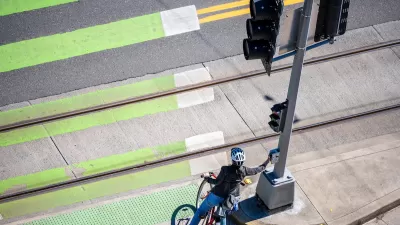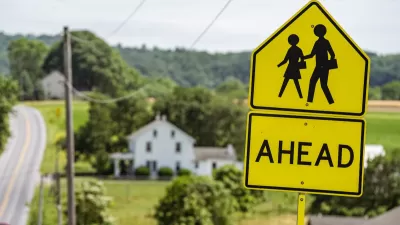The resolution acknowledges the epidemic of traffic fatalities and calls on DOT to focus on traffic safety with the goal of reducing roadway deaths to zero by 2050.

A non-binding bi-cameral resolution introduced by Sen. Richard Blumenthal (D-Conn.) and Rep. Jan Schakowsky (D-Ill.) seeks to address the rising number of traffic fatalities nationwide, according to Streetsblog.
The five-page resolution — which is co-sponsored by five senators and five representatives, all Democrats — puts a belated national focus on a growing public health crisis. According to National Traffic Safety Administration, the number of pedestrian fatalities jumped by 44 percent in the decade between 2010 to 2019, while deaths of cyclists in crashes rose 36 percent in the same period, spurred by the continued dominance of dangerous road designs as well as the the growth in popularity of larger vehicles like SUVs and pickups.
"If passed, the resolution would commit Congress and the U.S. Department of Transportation to work together to achieve zero roadway fatalities by 2050 and calls on the DOT to improve data gathering and implement measures that promote traffic safety." The resolution also acknowledges the importance of language, encouraging "the use of the term 'crash' and not 'accident' when describing traffic incidents," and promotes "efforts to address disparities and other equity-related issues related to transportation safety."
According to Vision Zero Network director Leah Shahum, the resolution represents an important first step. "Our priorities, plans, and policies are based on the goal we aim for, and we should not be aiming for some of our loved ones to be safe as they move about our communities — we should be working for safety for all." And while not all Vision Zero programs have shown success–in New York City, 43 pedestrians were killed in the first four months of 2021 alone–other cities, like Hoboken, managed to eliminate traffic deaths altogether.
FULL STORY: BREAKING: National ‘Vision Zero’ Resolution Introduced

Planetizen Federal Action Tracker
A weekly monitor of how Trump’s orders and actions are impacting planners and planning in America.

San Francisco's School District Spent $105M To Build Affordable Housing for Teachers — And That's Just the Beginning
SFUSD joins a growing list of school districts using their land holdings to address housing affordability challenges faced by their own employees.

The Tiny, Adorable $7,000 Car Turning Japan Onto EVs
The single seat Mibot charges from a regular plug as quickly as an iPad, and is about half the price of an average EV.

Seattle's Plan for Adopting Driverless Cars
Equity, safety, accessibility and affordability are front of mind as the city prepares for robotaxis and other autonomous vehicles.

As Trump Phases Out FEMA, Is It Time to Flee the Floodplains?
With less federal funding available for disaster relief efforts, the need to relocate at-risk communities is more urgent than ever.

With Protected Lanes, 460% More People Commute by Bike
For those needing more ammo, more data proving what we already knew is here.
Urban Design for Planners 1: Software Tools
This six-course series explores essential urban design concepts using open source software and equips planners with the tools they need to participate fully in the urban design process.
Planning for Universal Design
Learn the tools for implementing Universal Design in planning regulations.
Smith Gee Studio
City of Charlotte
City of Camden Redevelopment Agency
City of Astoria
Transportation Research & Education Center (TREC) at Portland State University
US High Speed Rail Association
City of Camden Redevelopment Agency
Municipality of Princeton (NJ)





























